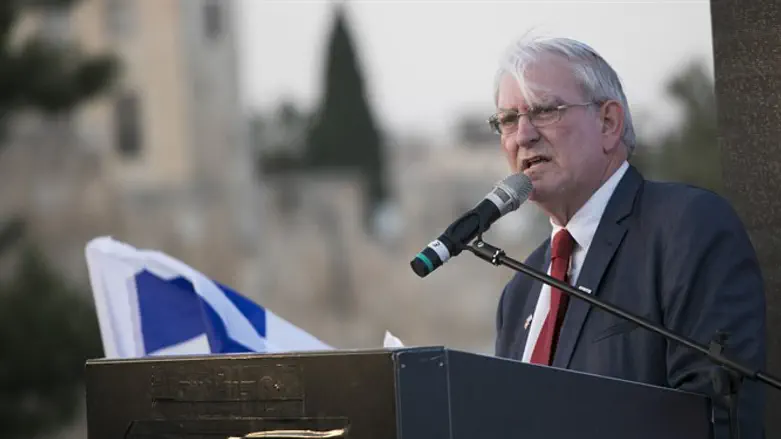
With reports swirling in both the US and Israel media of an imminent announcement by the Trump administration signaling either plans to relocate the US embassy to Jerusalem or formally recognizing the city as Israel’s capital, the chairman of the Republican party’s overseas division in Israel said that recognition would constitute a major, and in his view, positive, change in US policy.
According to a report by the Washington Post, President Trump has sought to fulfill his campaign promise to relocate the US embassy to Israel’s capital, but has been stymied by career national security officials who claim the move would complicate the president’s planned Middle East peace talks and weaken the US position in the Middle East.
A compromise position, some reports have suggested, was settled upon between Trump and those opposing any immediate moves vis-à-vis Israel’s capital. In place of relocating the embassy, the reports claim, the president will instead officially recognize Jerusalem as Israel’s capital.
While media outlets in the US and Israel have presented the alleged compromise deal as a minor step, Marc Zell, chairman of Republicans Overseas Israel, said that even without an embassy move, recognizing Jerusalem would constitute a major policy change for the US.
“Recognizing Jerusalem [as Israel’s capital] isn’t just symbolic,” Zell told Arutz Sheva. “It’s an important and dramatic historic move. It stands American policy as it has existed for the past seventy years on its head.”
“Depending on how it is phrased, recognition could be more important that moving the embassy,” said Zell, while emphasizing that he hopes President Trump does fulfill his 2016 campaign pledge to move the embassy.
“With that being said, we do hope the embassy is moved, because of the symbolic importance of Jerusalem, aside from the fact that the president and vice president promised it during the 2016 presidential campaign.”
“The move to recognize Jerusalem as Israel's capital will also have legal repercussions,” continued Zell. “The Supreme Court case on the American passport holders who were born in Jerusalem could be reversed as a result of this move,” Zell said, citing a recent case that dealt with that issue.
The case centered around a request by Menachem Binyamin Zivotofsky, an American citizen born in Jerusalem, to have his US passport list his place of birth as “Jerusalem, Israel”, rather than merely “Jerusalem”, with no country listed, as is the norm in the US Consulate..
The court ruled in 2015 by a 6-3 margin that Congress does not have the authority to require the executive branch to recognize Jerusalem as Israel’s capital.
On Monday, President Trump will be obliged to either extend a security waiver allowing the US embassy in Israel to remain in Tel Aviv for another six months, or prepare to relocate the embassy to Jerusalem.
Under the 1995 Jerusalem Embassy Act, the president is required to relocate the embassy, but may delay implementation for security purposes. Each waiver lasts for six months.
While every president since Bill Clinton has used the waiver throughout their eight years in office, including presidents Clinton, Bush, and Obama, President Trump has reportedly weighed the possibility of ending the deferments, ostensibly made over security concerns.
“I can say with certainty that the White House has scrutinized this issue, unlike previous presidents who just rubber-stamped it. This White House, under Trump and Pence, is very interested in moving the embassy – the only reason they haven’t as of yet is the negative impact [they believe] it would have on talks with the Palestinians, and those talks are needed in order to build a coalition against Iran.”